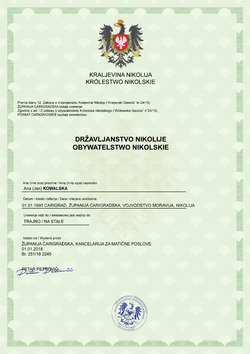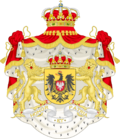Citizenship of Nikolia: Difference between revisions
No edit summary |
(Congratulations on having the featured article for March 2021!) |
||
| (One intermediate revision by one other user not shown) | |||
| Line 1: | Line 1: | ||
[[File:Drzavljanstvo Nikolije2018.png|thumb|right|250px|Citizenship certificate issued in Carigrad]] | {{featured_article}}{{Astyrian Featured Article}}[[File:Drzavljanstvo Nikolije2018.png|thumb|right|250px|Citizenship certificate issued in Carigrad]] | ||
{{wp|Citizenship}} of Nikolia ({{wp|Serbian}}: ''Državljanstvo Nikolije'', {{wp|Polish|Mazurian}}: ''Obywatelstwo nikolskie'') is a status given to those who were born in or have significant connection with [[Nikolia]]. It is based primarily on the principle of {{wp|jus sanguinis}} and can be acquired by birth, ancestry, naturalisation or granted by the [[Monarchy of Nikolia|Monarch of Nikolia]]. | {{wp|Citizenship}} of Nikolia ({{wp|Serbian}}: ''Državljanstvo Nikolije'', {{wp|Polish|Mazurian}}: ''Obywatelstwo nikolskie'') is a status given to those who were born in or have significant connection with [[Nikolia]]. It is based primarily on the principle of {{wp|jus sanguinis}} and can be acquired by birth, ancestry, naturalisation or granted by the [[Monarchy of Nikolia|Monarch of Nikolia]]. | ||
By the Nikolian citizenship law, holders of the Nikolian citizenship have certain special rights and duties: Nikolian citizens have right to vote on elections and to run for public office and to be protected and assisted by the Nikolian embassies and consulates abroad. However, Nikolian citizens also have a duty to complete compulsory military service or other type of compulsory service, and to respond to serve in case of national emergency. | By the Nikolian citizenship law, holders of the Nikolian citizenship have certain special rights and duties: Nikolian citizens have right to vote on elections and to run for public office and to be protected and assisted by the Nikolian embassies and consulates abroad. However, Nikolian citizens also have a duty to complete compulsory military service or other type of compulsory service, and to respond to serve in case of national emergency. | ||
Latest revision as of 16:06, 7 March 2021
Citizenship of Nikolia (Serbian: Državljanstvo Nikolije, Mazurian: Obywatelstwo nikolskie) is a status given to those who were born in or have significant connection with Nikolia. It is based primarily on the principle of jus sanguinis and can be acquired by birth, ancestry, naturalisation or granted by the Monarch of Nikolia. By the Nikolian citizenship law, holders of the Nikolian citizenship have certain special rights and duties: Nikolian citizens have right to vote on elections and to run for public office and to be protected and assisted by the Nikolian embassies and consulates abroad. However, Nikolian citizens also have a duty to complete compulsory military service or other type of compulsory service, and to respond to serve in case of national emergency.
Acquiring citizenship
By birth
A minor acquires Nikolian citizenship if:
- At the time of its birth at least one parent holds Nikolian citizenship.
- He was born on the territory of Nikolia and his parents are either unknown, hold no citizenship, or their nationality is undefined.
Special rules apply to minors born abroad with at least one parent holding Nikolian citizenship, namely, he does not automatically acquire Nikolian citizenship, however his parents can file a request for Nikolian citizenship by the age of sixteen.
By naturalisation
A person can be naturalised, or recognised as Nikolian citizen under following conditions:
- A foreigner residing continuously in Nikolia for at least 10 years on the basis of permanent residence permit and who has a regular source of income and legal title to the occupied dwelling.
- A foreigner, who is married to a Nikolian citizen for at least 3 years and resides continuously in Nikolia on the basis of permanent residence permit for at least 3 years, or holds no citizenship.
- A foreigner with refugee status residing continously in Nikolia for at least 3 years on the basis of permanent residence permit.
- A foreigner who is granted Nikolian citizenship by the Monarch of Nikolia.
The process of naturalisation consists of a Citizenship test, proof of language proficiency and, upon successful completion of the previous two tests, oath of allegiance to the Crown. The citizenship test is a written test consisting of 40 questions about the Nikolian culture, history and politics. After the Citizenship test, the language proficiency test is performed in 3 parts where grammar, writing and verbal skills are tested. Foreigners can provide certificate of language proficiency in Serbian or Mazurian, which shortens the language proficiency test to only verbal skills test. After the entire process, the applicants are provided with the results within 7 days.
Citizenship ceremony
Upon receiving positive results, the applicant is invited to a ceremony in the Voivodeship palace depending of the place of application. The ceremony involves reading an Oath of Allegiance in front of the Nikolian flag, with the left arm on the Bible and the Nikolian Constitution, and the right arm raised. After the oath, a person affixes his signature in the citizenship register, and is handed with the original citizenship certificate and a copy of the Nikolian Constitution. As Voivode hands the citizenship certificate, he greets the new citizen with a phrase: "Welcome among Nikolians".
Oath of Allegiance
English:
I, [name] solemnly pledge allegiance to His Royal Highness King Aleksandar the Second and the Kingdom of Nikolia, i swear that i will respect and defend the Constitution of Nikolia, Nikolian values, culture, history and tradition. I solemnly renounce allegiance to other country, its military and ruler, and reaffirm allegiance to Nikolia, and confirm that i will, should i be called, help Nikolia and its people in case of war or other catastrophes, so help me God.
Serbian:
Ja, [ime i prezime] svečano se zaklinjem na vernost Njegovom Kraljevskom Visočanstvu Kralju Aleksandru drugom i Kraljevini Nikoliji, da ću poštovati i braniti Ustav Nikolije, njene vrednosti, kulturu, istoriju i tradiciju. Svečano se zaklinjem da se odričem vernosti prema drugoj naciji, njenoj vojsci i vladaru, a potvrđujem vernost Nikoliji i potvrđujem da ću, ako budem pozvan, pomoći Nikoliji i njenom narodu u slučaju rata ili drugih nesreća, tako mi pomogao Bog.
Mazurian:
Ja, [imię i nazwisko], uroczyście przysigam wierność na Swej Królwwskiej Wysokości, Królowi Aleksandrowi II i Królestwa nikolskiego, klnę że będę szanował jej Konstytucję, wartości, kulturę i tradycję. Uroczyście przysięgam, że wyrzeknę się lojalności wobec innego narodu, jego armii i władcy, i potwierdzę wierność Nikolii, i potwierdzę że, gdy mnie wezwano, będę pomóc Nikolii i narodzie swym w razie wojny lub innych katastrof, tak mi dopomóż Bóg.
The Oath is taken with the right hand pulled up with the middle and index fingers extended and touching each other, while the ring and little fingers are bent and touched by the thumb, while the left hand rests on the Constitution of Nikolia and the holy book. The persons can decide whether they want to take an oath with the holy book and whether they want to end the oath with "...so help me God", however, prior notice is required.
Loss of Nikolian citizenship
Nikolian citizenship can be lost in following situations:
- When a Nikolian citizen voluntarily acquires citizenship of another country;
- If a Nikolian citizen voluntarily serves in a foreign army without the special permission of the Nikolian government;
- If Nikolian baby gets adopted by foreign parents it automatically loses Nikolian citizenship, considering it automatically receives foreign citizenship;
- If a person born abroad with at least one Nikolian parent does not apply for Nikolian citizenship up to the age of 16, it loses right for automatic Nikolian citizenship.
Dual citizenship
Dual citizenship is allowed under the following circumstances:
- If a person holds citizenship of Aquitayne, Maltropia, Romberg, or Lorecian Community member, or for citizens of a country that does not allow its citizens to renounce its citizenship.
- If the person is a refugee and holds a refugee travel document during naturalization.
- If a child born to Nikolian citizens (or one Nikolian parent) acquires citizenship of another country based on jus soli.
- Rarely, in individual cases if the renunciation of the old citizenship means enormous disadvantages for the concerned person, or if the renunciation process is too difficult, humiliating or expensive.

